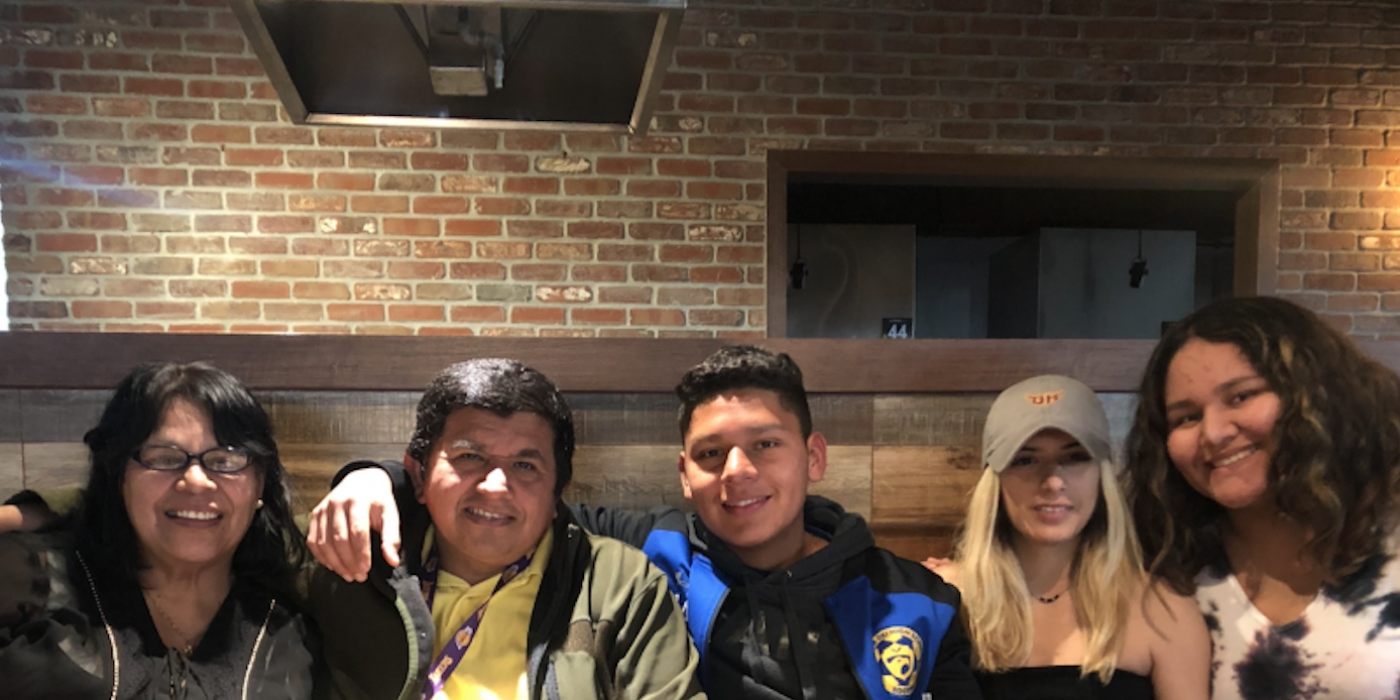The Milken Center for Advancing the American Dream shares diverse perspectives relating to our four pillars and the American Dream. The Dream looks different and means something different to everyone. While views and opinions expressed here are those of the authors and do not necessarily reflect the Center’s position, we believe it is important to explore issues from many angles to promote productive dialogue.
Para leer este blog en español, haga clic aquí.
When people ask me where I’m from, I instinctively look down. Almost ashamed, I respond, “South Central.” I stand there waiting for them to react. I think in my head, “what will they think of me?” Sometimes they say, “oh that’s cool.” But most of the time I just get weird stares. I can only imagine the stereotypes going through their minds. Just telling them where I’m from, they now know my socioeconomic status, the neighborhood I grew up in, and the type of person I might be.
Residing in South Central, an impoverished neighborhood riddled with crime and substandard living conditions, is a daily challenge. Commodities are rare. Luxuries are non-existent. Going out to watch a movie as a family, or going on a Starbucks run, or even going out to eat is scarce. We collect bottles to receive a CRV refund at recycling centers, attend every fair, giveaway, or event offering handouts, and are always making frugal monetary decisions.
I have participated in various community programs, interacting with students from different places, backgrounds, and ethnicities. They were kind, and they always made me feel welcomed. However, there was something that made me feel uncomfortable. They often mentioned how they would take family trips to other states or even countries. I can’t. We can’t afford it.
The places we shopped were different. My clothes came from Walmart, Ross, and gifts/hand me downs. They mentioned how their parents tutored them, or how their parents helped them apply to summer camp, to college, how to apply for scholarships and so much more. I wanted to feel like them. I wanted to feel normal.
My family is the perfect paradigm of the struggles of first-generation immigrants. Month by month we scrape by with the support of EBT, the magnanimous support of others, and my father’s interminable labor.
My father works for Farmer John’s where he stands in an industrialized line all day removing ribs from a large sum of domestic pigs. He wakes up every day at 4 a.m. to go to work and returns at around 4 p.m. The first thing he does is greet his family. He tells us, “los quiero mucho.” We then gather at the table to eat as a family. After the meal, my father immediately goes to bed, exhausted. I can only imagine how hard his work must be. Every day is a constant struggle. He doesn’t want us to worry about him. He only wants us to be happy and focus on our studies.
Despite all of my father's hard work, we barely scrape by. Luxuries are only bought when there is a bonus or a tax return. Yet I seldom ever see my father angry. He puts on a smile so we don’t worry. But I can see it in his eyes; he’s tired and deeply worried he’ll be able to pay the mortgage and utilities bills or deal with a financial emergency.
My father, as an “essential worker,” continues to work -- risking his life. Imagine loving his family so much to report to work during such trying times and still maintain a positive attitude when he comes home. He continues to tell us “los quiero mucho.” To see him leave worries me. When he returns, I am filled with joy and I look forward to those words. They are an assurance that everything will be okay as long as I have my family with me.
During my junior year I was recommended for a program to visit universities such as Harvard, Stanford, Yale, etc. However, the program had a high price. I was excited nonetheless to tell my father, but I didn’t get the response I was looking for. He said no, we simply could not afford it. To protect him, I lied and said it was fine.
But later that evening my father came into my room and told me about our financial situation. He began apologizing for being a bad father and for not being able to provide me with everything I deserve. My hero sat there at my bedside crying. I assured him that he was not a bad father. That he was the hardest working man I know. That I deeply love and respect him. It didn’t matter that we were poor or that I couldn’t go on the trip. Nothing mattered as long as we had each other.
My parents both took perilous journeys to seek the American Dream. They paid the coyotes (smugglers) to be able to come to the US. I recall my mother’s story the most. She was in the desert, the scorching heat on her back, the constant worry that she’ll be caught, and the need to keep going despite malnourishment and sleep deprivation. At one point she was forced into a river to hide from border patrol. She described how the current was taking her. She had trouble breathing.
I simply sat there listening, emotionally distraught. She came a point where she had to get into a vehicle. She was placed in the trunk with six others. The heat from the desert and the humidity in the vehicle made it a living hell. My mother had trouble breathing -- not even animals are treated this way.
My mother, my loving hero, continues to nurture us. She fearlessly goes out to food banks in order to provide us with nutritious meals, despite the dangers of the Coronavirus outbreak. We do not allow her bravery to go to waste. We preserve dispensable plates, cups, and eating utensils for reuse. The plastic bags we preserve to use as trash bags.
Every day, when she goes out into the world, I fear for her. I worry that something might happen to her. She reminds me how strong her love for me is. To put her own life at risk, truly no love is greater than that of a mother.
She is truly an inspiration. Not only because of the adversity she faced coming to the US, but for the adversity she continues to face. My mom has diabetes. As a sophomore, I received extremely frightening news: she had a tumor in her kidney. I was scared, worried, and lost. As a family, we cried together, prayed together, hoped together that the tumor would be benign. The day it was surgically removed was the longest day of my life. A few days later was the best; the tumor was benign!
My mom and dad sacrificed everything, crossing the US-Mexico border to provide my family with opportunities not available in Mexico. I may not be privileged in the sense of money, but I am privileged to have such loving and supportive parents. Privileged to have such an immense love in my life that has sparked in me a desire to set the world on fire. To succeed. To make the world better. While it is said that parents metaphorically move mountains for their kids, my parents literally moved countries. Every sacrifice they have made has been for us and that's why everything I do … I do for them.
This has generated in me an emphatic intent to utilize my education to serve my community as an immigration lawyer. Despite all the controversy surrounding immigration I am certain that immigrants can improve the economy and society. They contribute positively to the economy and enrich culture. I plan to provide immigrants the opportunity to seek the American Dream and in turn make America better.
My parents now are naturalized American citizens, and they are my heroes. They want to pursue the American Dream without a wall built on hatred and prejudice. The US immigration System is broken and has separated too many families, forcing them to live in darkness and fear. No children should live without a parent. I hope to open people's hearts to see the love and understanding that will humanize immigrants. To look beyond the way the media portrays us and the dehumanizing accusations some politicians have made.
After all, immigrants are people … just like me and my family.
My perseverance and success in the face of adversity, scoring in the top 5% of my class, taking leadership roles in varsity sports and extracurriculars, my volunteer service with a local youth group, and my internship at Latham & Watkins LLP are evidence that I have lived a life of purpose. My parents may not have been able to give me much materially, but they have sacrificed in every way possible to provide me with an education. I must continue, so that I can someday sacrifice for them.
Jesus Estrada is a high school senior at Verbum Dei High School in Los Angeles. This summer he will join the Milken Center for Advancing the American Dream as an intern before beginning college at Loyola Marymount University in the fall.









